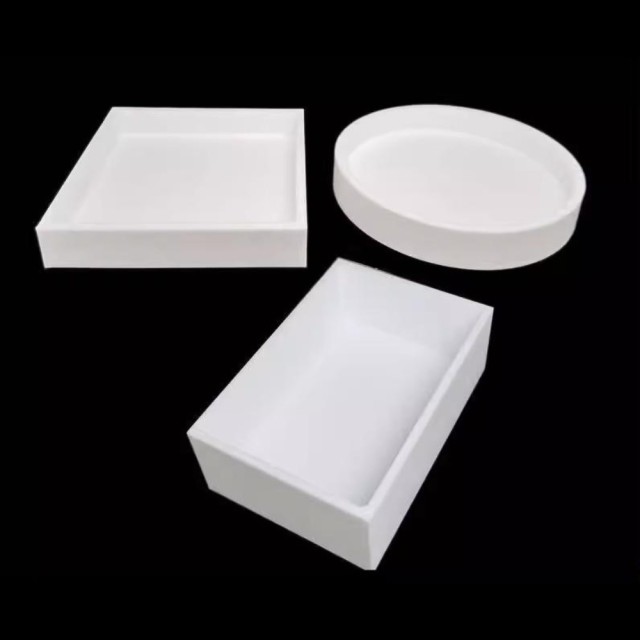
PTFE material
Custom PTFE Teflon Parts Manufacturer for Culture Dish and Evaporation Dish
Item Number : PTFE-26
Price varies based on specs and customizations
- Material
- PTFE
- Specification
- See the form
Shipping:
Contact us to get shipping details Enjoy On-time Dispatch Guarantee.
Why Choose Us
Easy ordering process, quality products, and dedicated support for your business success.
Introduction
The PTFE evaporating dish is a versatile laboratory tool designed for various applications in scientific research and industrial processes. Known for its chemical resistance and thermal stability, PTFE is an ideal material for evaporating dishes used in environments where high temperatures and corrosive substances are common. Below are the main application areas of PTFE evaporating dishes:
- Chemical Analysis: Used in laboratories for evaporating solvents and concentrating samples, especially when dealing with corrosive chemicals.
- Material Science: Employed in the synthesis and processing of materials that require a non-reactive surface during evaporation processes.
- Pharmaceutical Industry: Essential in the preparation and concentration of pharmaceutical compounds, where purity and chemical inertness are critical.
These applications highlight the robustness and utility of PTFE evaporating dishes in maintaining the integrity of samples while enduring harsh chemical and thermal conditions.
Details & Parts
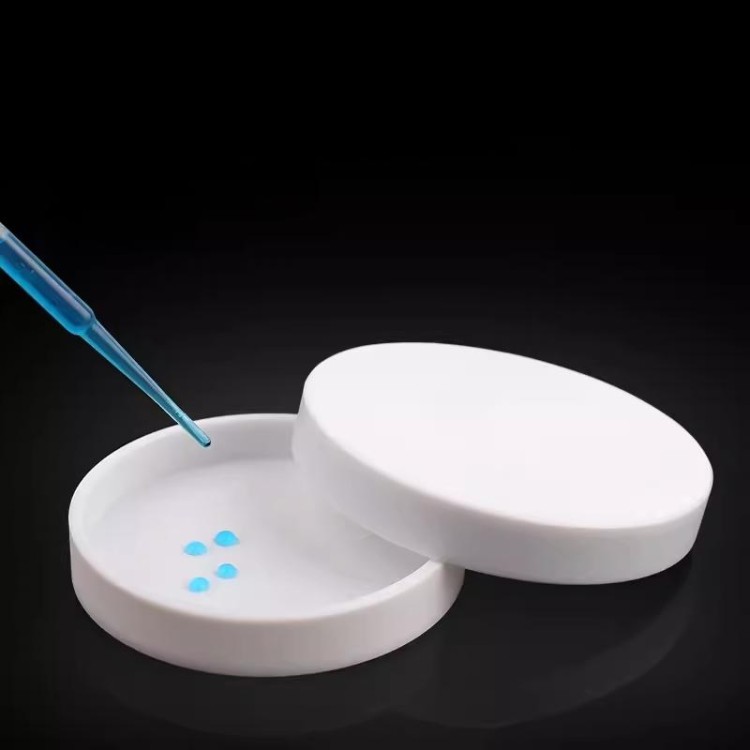
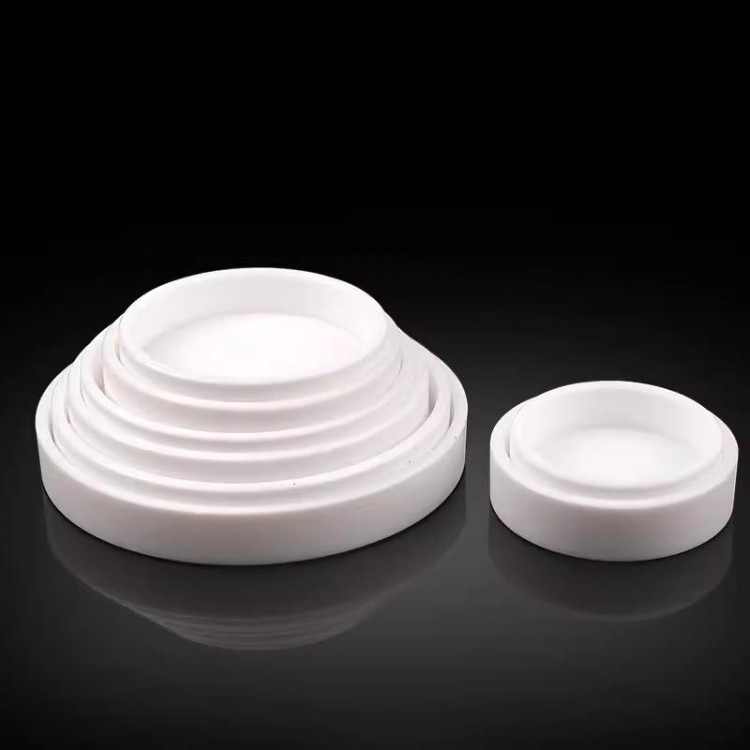
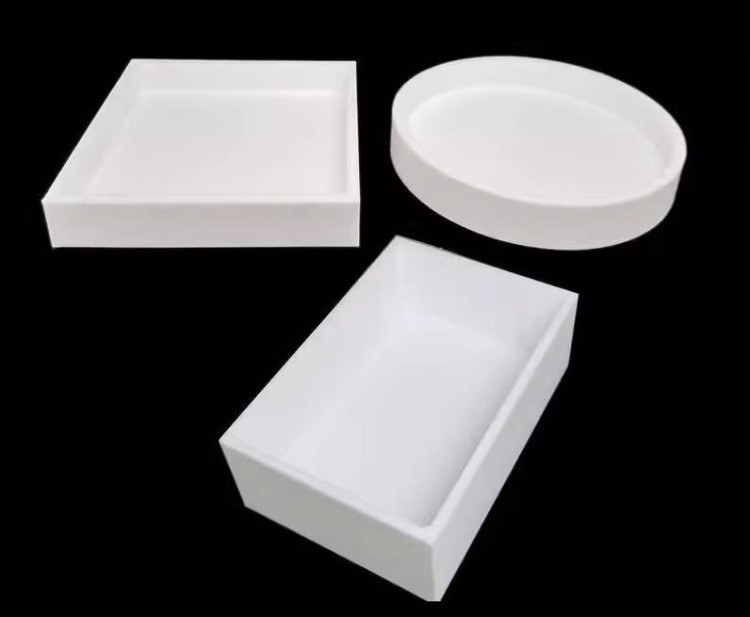
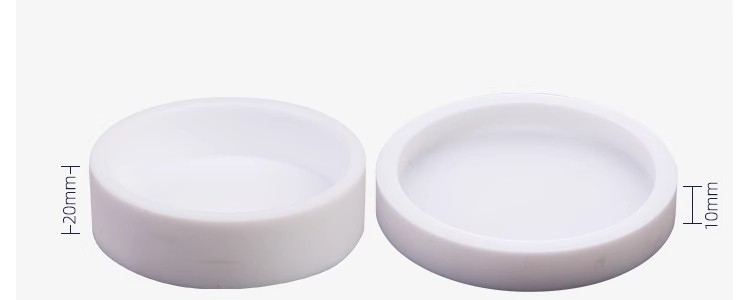
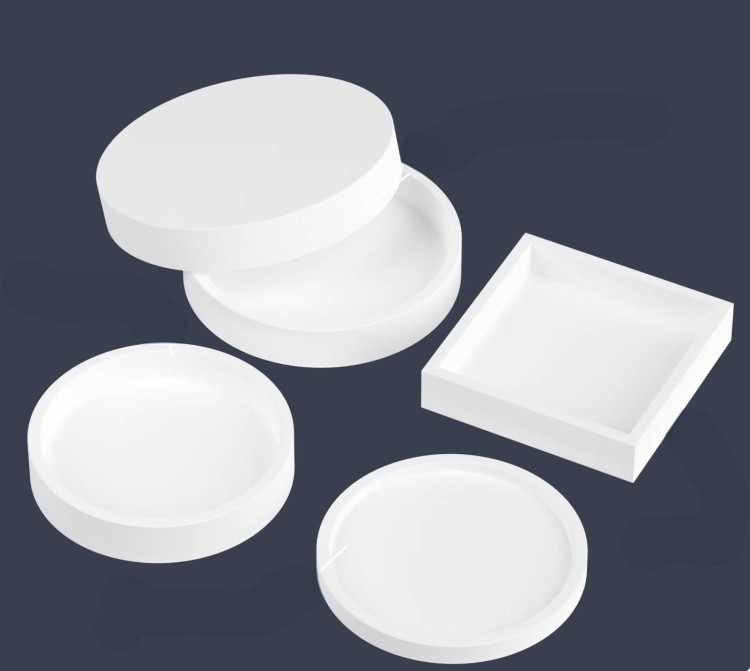
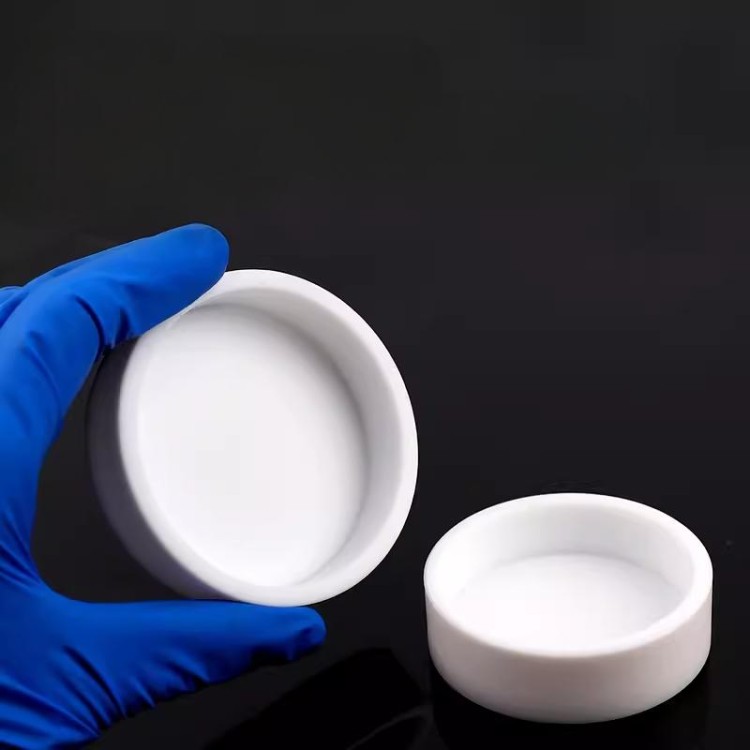

Technical specifications
Round culture dish:
| Model | Bottom outer diameter(mm) | Mouth Inner Diameter(mm) | Total height(mm) | Bottom thickness(mm) | Wall thickness(mm) |
|---|---|---|---|---|---|
| Shallow20mm | 20 | 15 | 10 | 5 | 2.5 |
| Shallow30mm | 30 | 25 | 10 | 5 | 2.5 |
| Shallow40mm | 40 | 30 | 10 | 5 | 5 |
| Shallow50mm | 50 | 40 | 10 | 5 | 5 |
| Shallow60mm | 60 | 50 | 10 | 5 | 5 |
| Shallow80mm | 80 | 70 | 10 | 5 | 5 |
| Shallow90mm | 90 | 80 | 10 | 5 | 5 |
| Shallow100mm | 100 | 90 | 10 | 5 | 5 |
| Shallow120mm | 120 | 110 | 10 | 5 | 5 |
| Deep20mm | 20 | 15 | 20 | 5 | 2.5 |
| Deep30mm | 30 | 25 | 20 | 5 | 2.5 |
| Deep40mm | 40 | 30 | 20 | 5 | 5 |
| Deep50mm | 50 | 40 | 20 | 5 | 5 |
| Deep60mm | 60 | 50 | 20 | 5 | 5 |
| Deep80mm | 80 | 70 | 20 | 5 | 5 |
| Deep90mm | 90 | 80 | 20 | 5 | 5 |
| Deep100mm | 100 | 90 | 20 | 5 | 5 |
| Deep120mm | 120 | 110 | 20 | 5 | 5 |
Square culture dish:
| Model | Outside length(mm) | Inner side length(mm) | Height(mm) | Bottom thickness(mm) | Wall thickness(mm) |
|---|---|---|---|---|---|
| Square40mm | 40 | 30 | 20 | 5 | 5 |
| Square50mm | 50 | 40 | 20 | 5 | 5 |
| Square60mm | 60 | 50 | 20 | 5 | 5 |
| Square70mm | 70 | 60 | 20 | 5 | 5 |
| Square80mm | 80 | 70 | 20 | 5 | 5 |
| Square90mm | 90 | 80 | 20 | 5 | 5 |
| Square100mm | 100 | 90 | 20 | 5 | 5 |
| Square110mm | 110 | 100 | 20 | 5 | 5 |
| Square120mm | 120 | 110 | 20 | 5 | 5 |
The size is for reference only, please refer to the actual product.
Advantages
The PTFE evaporating dish offers a range of unparalleled advantages due to the unique properties of PTFE (Polytetrafluoroethylene), making it an ideal choice for various laboratory applications. Here are some of the key benefits:
- Chemical Stability and Corrosion Resistance: PTFE is renowned for its exceptional resistance to chemical corrosion. The fluorine atoms in PTFE molecules form a robust protective layer around the carbon chain, making it impervious to most chemicals, including strong acids and bases. This makes the PTFE evaporating dish suitable for handling a wide array of corrosive substances without degradation.
- High Heat Resistance: With a melting temperature of 324°C and a maximum use temperature of 250°C, PTFE evaporating dishes can withstand high heat, making them ideal for high-temperature evaporation processes. This heat tolerance also extends to their thermal shock resistance, ensuring durability and safety during use.
- Excellent Dielectric Properties: PTFE exhibits outstanding electrical insulation properties, with a volume resistivity of up to 10^18 Ω·cm. This makes the PTFE evaporating dish suitable for applications involving electrical components or where electrical insulation is crucial.
- Low Surface Friction: The structure of PTFE molecules results in a very low surface friction coefficient, which aids in the smooth movement of substances within the dish during evaporation, reducing the risk of material adhesion and facilitating easier cleaning.
These advantages make PTFE evaporating dishes a superior choice for laboratories and industries requiring reliable, durable, and chemically resistant equipment for their evaporation needs.
Designed for You
KinTek provide deep custom made service and equipment to worldwide customers, our specialized teamwork and rich experienced engineers are capable to undertake the custom tailoring hardware and software equipment requirements, and help our customer to build up the exclusive and personalized equipment and solution!
Would you please drop your ideas to us, our engineers are ready for you now!
Trusted by Industry Leaders

4.8 / 5
Exceptional chemical resistance!
4.7 / 5
High temperature tolerance is superb.
4.9 / 5
Non-stick surface saves time.
4.6 / 5
Lightweight and durable.
4.8 / 5
Excellent dielectric properties.
4.7 / 5
Perfect for corrosive environments.
4.9 / 5
Autoclavable, very convenient.
4.6 / 5
Smooth internal finish aids cleaning.
4.8 / 5
Ideal for high-temp experiments.
4.7 / 5
Non-toxic, safe for all labs.
4.9 / 5
Robust and reliable.
4.6 / 5
Versatile and efficient.
4.8 / 5
Great for academic research.
4.7 / 5
Excellent value for money.
4.9 / 5
Highly recommended for purity needs.
4.6 / 5
Durable and long-lasting.
4.8 / 5
Technologically advanced and effective.
REQUEST A QUOTE
Our professional team will reply to you within one business day. Please feel free to contact us!
Related Products
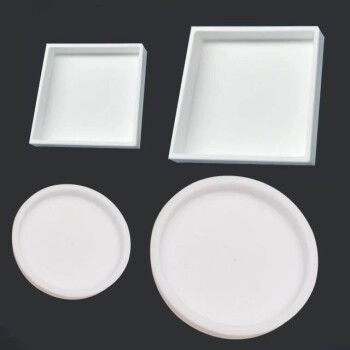
Custom PTFE Teflon Parts Manufacturer for PTFE Containers
PTFE container is a container with excellent corrosion resistance and chemical inertness.

Custom PTFE Teflon Parts Manufacturer for PTFE Measuring Cylinder 10/50/100ml
PTFE measuring cylinder are a rugged alternative to traditional glass cylinders. They are chemically inert over a wide temperature range (up to 260º C), have excellent corrosion resistance and maintain a low coefficient of friction, ensuring ease of use and cleaning.
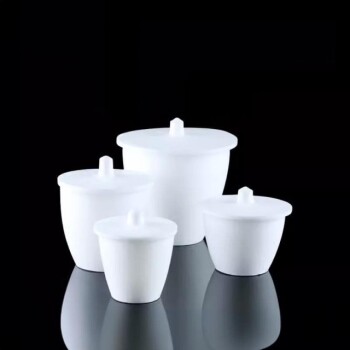
Custom Machined and Molded PTFE Teflon Parts Manufacturer with PTFE Crucible and Lid
PTFE crucibles, made from pure Teflon, offer chemical inertness and resistance from -196°C to 280°C, ensuring compatibility with a wide range of temperatures and chemicals. These crucibles feature machine-finished surfaces for easy cleaning and prevention of contamination, making them ideal for precise laboratory applications.
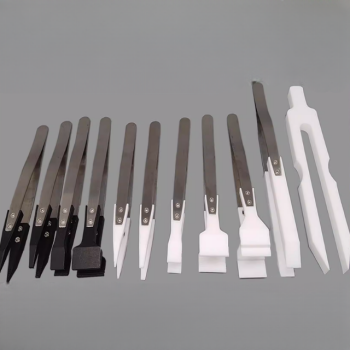
Custom PTFE Teflon Parts Manufacturer for PTFE Tweezers
PTFE tweezers inherit the excellent physical and chemical properties of PTFE, such as high temperature resistance, cold resistance, acid and alkali resistance, and corrosion resistance to most organic solvents.
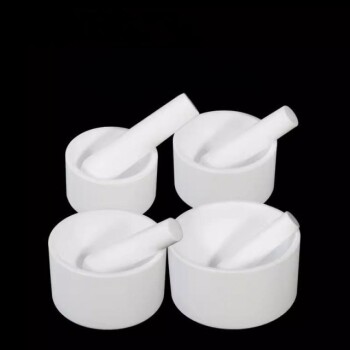
Custom PTFE Teflon Parts Manufacturer Grinding Bowl
PTFE is renowned for its exceptional chemical resistance, thermal stability, and low friction properties, making it a versatile material in various industries. The PTFE grinding bowl, specifically, finds applications where these properties are crucial.
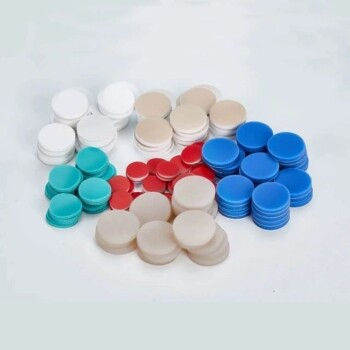
Custom PTFE Teflon Parts Manufacturer for Gaskets and More
Gaskets are materials placed between two flat surfaces to enhance the seal. To prevent fluid leakage, sealing elements are arranged between static sealing surfaces.

Custom PTFE Teflon Parts Manufacturer F4 Conical Flask Triangular Flask 50 100 250ml
The PTFE triangular flask, also known as a Teflon reagent bottle, is a robust, chemical-resistant alternative to traditional glass bottles, suitable for handling both acids and alkalis. These bottles are unbreakable, lightweight, and feature a leak-proof screw cap, making them ideal for laboratory use.
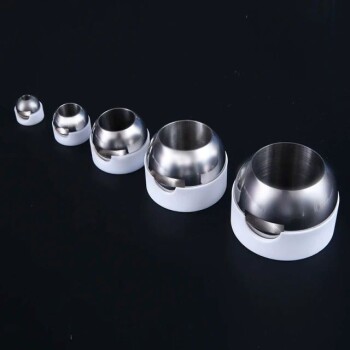
Custom PTFE Teflon Parts Manufacturer for PTFE Ball Valve Seat
Seats and inserts are vital components in the valve industry. As a key component, polytetrafluoroethylene is usually selected as the raw material.

Custom PTFE Teflon Parts Manufacturer PTFE Beaker and Lids
The PTFE beaker is a laboratory container that is resistant to acid, alkali, high and low temperatures and is suitable for temperatures ranging from -200ºC to +250ºC. This beaker has excellent chemical stability and is widely used for heat treatment samples and volume analysis.
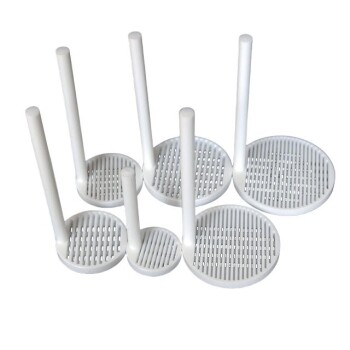
Custom PTFE Teflon Parts Manufacturer for Cleaning Racks
PTFE cleaning racks are mainly made of tetrafluoroethylene. PTFE, known as the "King of Plastics", is a polymer compound made of tetrafluoroethylene.

Custom PTFE Teflon Parts Manufacturer for PTFE Buchner Funnel and Triangular Funnel
The PTFE funnel is a piece of laboratory equipment used primarily for filtration processes, particularly in the separation of solid and liquid phases in a mixture. This setup allows for efficient and rapid filtration, making it indispensable in various chemical and biological applications.
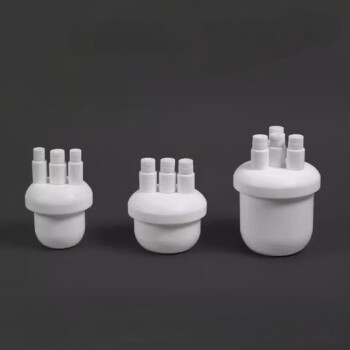
Custom PTFE Teflon Parts Manufacturer for Three-Necked Round Bottom Flask
PTFE flask, is a versatile laboratory container made from PTFE, offering exceptional chemical resistance, temperature stability, and non-stick properties. Ideal for handling corrosive substances and high-temperature applications, these flasks are essential in various laboratory procedures, including heating, mixing, and storage of chemicals.

Custom PTFE Teflon Parts Manufacturer for PTFE Mesh F4 Sieve
PTFE mesh sieve is a specialized test sieve designed for particle analysis in various industries, featuring a non-metallic mesh woven from PTFE filament. This synthetic mesh is ideal for applications where metal contamination is a concern . PTFE sieves are crucial for maintaining the integrity of samples in sensitive environments, ensuring accurate and reliable results in particle size distribution analysis.

Custom PTFE Teflon Parts Manufacturer for Magnetic Stirring Bar
The PTFE magnetic stirring bar, made from high-quality PTFE, offers exceptional resistance to acids, alkalis, and organic solvents, coupled with high-temperature stability and low friction. Ideal for laboratory use, these stirring bars are compatible with standard flask ports, ensuring stability and safety during operations.
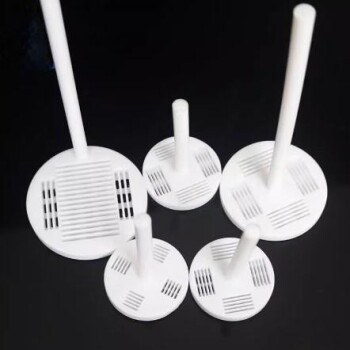
Custom Machined and Molded PTFE Teflon Parts Manufacturer for Laboratory ITO FTO Conductive Glass Cleaning Flower Basket
PTFE cleaning racks are mainly made of tetrafluoroethylene. PTFE, known as the "King of Plastics", is a polymer compound made of tetrafluoroethylene.
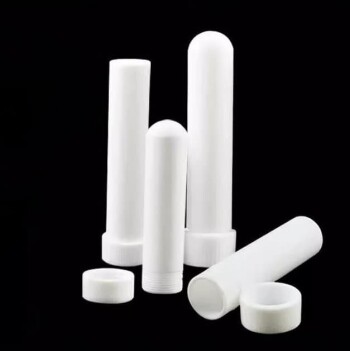
Custom PTFE Teflon Parts Manufacturer for Centrifuge Tubes
PTFE centrifugal tubes are highly valued for their exceptional chemical resistance, thermal stability, and non-stick properties, making them indispensable in various high-demand sectors. These tubes are particularly useful in environments where exposure to corrosive substances, high temperatures, or stringent cleanliness requirements are prevalent.
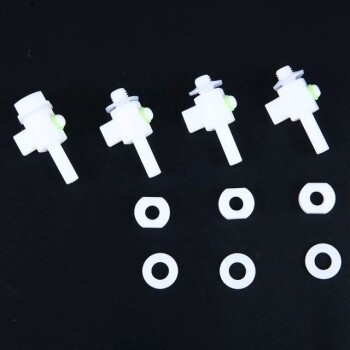
Custom PTFE Teflon Parts Manufacturer for Air Valve Applications
PTFE small air valve for gas-liquid sampling and sampling bag for sample collection.
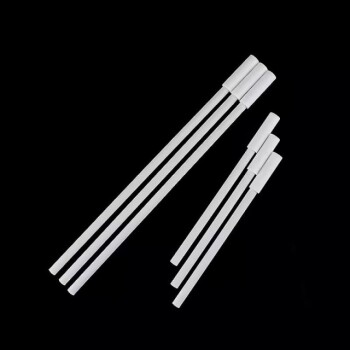
Custom PTFE Teflon Parts Manufacturer for PTFE Stirring Bar Recovery Rod
This product is used for stirrer recovery, and is resistant to high temperature, corrosion, and strong alkali, and is almost insoluble in all solvents. The product has a stainless steel rod inside and a polytetrafluoroethylene sleeve outside.
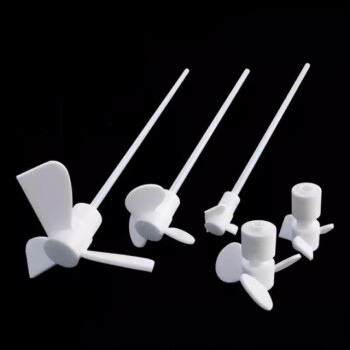
Custom PTFE Teflon Parts Manufacturer Laboratory High Temperature Mixing Paddle Mixer
The PTFE mixing paddle mixer is a versatile and robust tool designed for laboratory use, particularly in environments requiring high resistance to chemicals and extreme temperatures. Crafted from high-quality PTFE, this mixer boasts several key features that enhance its functionality and durability.
Related Articles

In-depth analysis of the key characteristics and advantages of polytetrafluoroethylene
This paper will take an in-depth look at the key properties of polytetrafluoroethylene (PTFE), such as high-temperature resistance, corrosion resistance and low friction, as well as the wide range of applications and advantages in industry and everyday life.

Exploring the Multifunctional Electrolytic Cell Water Bath: Applications and Benefits
Discover the versatile applications of multifunctional electrolytic cell water baths in various industries. Learn about their benefits, components, and how they facilitate chemical reactions and temperature control.

Understanding and Selecting the Right Microplates for Laboratory Applications
Guide to choosing microplates based on pore density, materials, colors, well shapes, and surface finishes for various laboratory applications.

The Silent Partner: Why Material Choice in Electrochemistry is a Matter of Trust
Discover why high borosilicate glass and PTFE are the non-negotiable standards for electrolytic cells. A deep dive into material science for precise data.

The Art of the Shutdown: Engineering Reliability in Electrochemical Cells
Post-experiment procedures are not chores; they are the foundation of future accuracy. Learn the disciplined protocol for maintaining double-layer electrolytic cells.

Emerging Green Solvents in Photovoltaic Module Recycling
Exploring the shift towards green solvents in PV module recycling, focusing on deep eutectic solvents and their advantages.

The Architecture of Silence: Why Material Choice Defines Electrochemical Truth
Explore how High Borosilicate Glass, PTFE, and POM create the perfect chemically inert environment for accurate electrochemical testing.

Performance and application of polytetrafluoroethylene (PTFE) in high temperature environment

The Geometry of Trust: Stabilizing the Electrochemical Cell
Data integrity begins with physical stability. Learn how to adjust your PTFE electrode stand to master gravity, eliminate vibration, and ensure reproducibility.

Advanced Technologies for Precision Ceramics
Explores key technologies and preparation methods for precision ceramic components, highlighting their applications and challenges.

The Silent Geometry of Voltage: Respecting the Limits of Electrolysis
Electrolysis relies on strict electrical boundaries. Learn why exceeding rated current and voltage isn't just inefficient—it's destructive.

The Art of the Finish: Why the Most Critical Moment Happens After the Data is Collected
The experiment isn't over when the data is saved. Learn the psychological and technical art of shutting down and cleaning optical electrolytic cells.